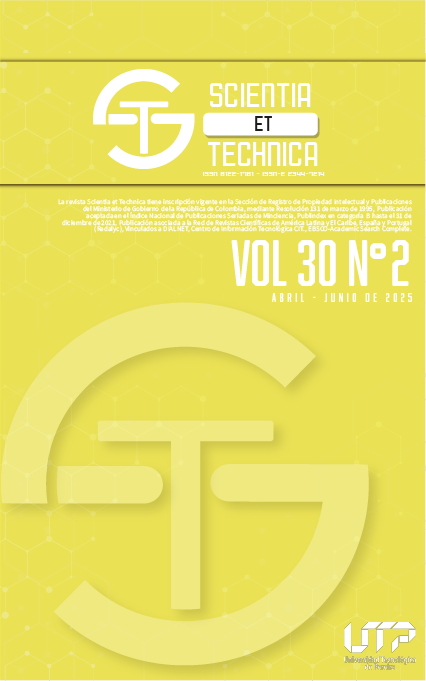Analysis of the conversion efficiency and THD of DC/AC converters used in off-grid Photovoltaic generation system
DOI:
https://doi.org/10.22517/23447214.24807Keywords:
Experimental Design, Total Harmonics Distortion (THD), Efficiency, Inverter.Abstract
This article presents an experimental analysis of the conversion efficiency and total harmonic distortion (THD) of two DC/AC converter prototypes designed for off-grid photovoltaic generation systems (OPGS). The objective is to determine the influence of two controllable factors; the DC input voltage and the percentage of nominal load at the output, on the converters’ performance. The prototypes, based on unipolar SPWM modulation, were implemented using simulation software, and tested under a factorial experimental design. The study applied statistical methods, including ANOVA, to analyze the effect of each factor and their interaction on the two response variables: efficiency and THD. Results showed that for the first prototype, efficiency is independent of DC input voltage but dependent on load, while THD is influenced by both factors. In the second prototype, both efficiency and THD are affected by variations in both factors, with THD showing instability due to LC network resonance. The comparison reveals that locating the LC filter after the transformer slightly improves THD but reduces efficiency due to increased harmonic losses. These findings are relevant for optimizing inverter design in isolated PV systems.
Downloads
References
M. Albakri, A. Darwish, and P. Twigg, “A Comprehensive Review of DC/AC Single-Phase Differential-Mode Inverters for Low-Power Applications,” *Electronics*, vol. 13, no. 13, p. 2474, 2024. https://doi.org/10.3390/electronics13132474.
MDPI Energies, “A Comparative Review of Three Different Power Inverters for DC–AC Applications,” *Energies*, vol. 16, no. 21, p. 7254, 2023. https://doi.org/10.3390/en16217254
S. Shrestha et al., “A Comparative Analysis of Transformer-less Inverter Topologies for Grid-Connected PV Systems,” *arXiv preprint arXiv:2501.08103*, 2025.
M. Bouzguenda and T. Selmi, “Review of DC-AC converters for photovoltaic conversion chains,” *International Journal of Power Electronics and Drive Systems (IJPEDS)*, vol. 12, no. 2, pp. 886–901, 2021.https://doi.org/10.1007/978-981-19-7728-2_15
R. Chaurasia and S. B. Singh, “Performance Analysis of Multi-level DC–AC Inverter for Solar Power Application,” in *Recent Advances in Power Electronics and Drives*, Springer, 2023.
H. Gutierrez and R. De la Vara, *Analysis and Design of Experiments*, 2nd ed., McGraw-Hill, 2016.
G. A. Rampinelli, A. Krenzinger, and F. Chenlo Romero, “Mathematical models for efficiency of inverters used in grid connected photovoltaic systems,” *Renewable and Sustainable Energy Reviews*, vol. 34, pp. 578–587, 2014. https://doi.org/10.1016/j.rser.2014.03.047
J. D. Gallego-Gomez, J. B. Cano-Quintero, and N. Muñoz-Galeano, “Deducción de pérdidas de potencia por conducción en inversores modulación senoidal de ancho de pulso, SPWM,” *Información Tecnológica*, vol. 26, no. 3, pp. 111–122, 2015.https://doi.org/10.4067/S0718-07642015000300015
Busso, C. Cadena, and L. Vera, “Determinación de la eficiencia de conversión del inversor empleado en un sistema de generación fotovoltaica conectado a red instalado en el nordeste argentino,” *Avances en Energías Renovables y Medio Ambiente*, vol. 15, pp. 17–24, 2011.
Beltrán Telles et al., “Análisis de calidad de la energía de inversor de puentes H y control SPWM,” *Ingeniería Energética*, vol. 41, no. 1, pp. 1–11, 2020.
D. Montgomery, *Design and Analysis of Experiments*, 8th ed., Wiley, 2012.
E. Lázaro Campo, *Optimización del índice de producción final de una instalación solar fotovoltaica para un inversor y emplazamientos dados*, Tesis de Maestría, 2012.
Horikoshi, *Análisis de las componentes armónicas de los inversores fotovoltaicos de conexión a red*, Tesis de Maestría, 2009.
R. A. da Câmara et al., “Comparative analysis of performance for single-phase AC-DC converters using FPGA for UPS applications,” in *Proc. IEEE APEC*, 2013, pp. 1852–1858. https://doi.org/10.1109/APEC.2013.6520547
R. Federico Farfán and C. Wilhelm Massen, “Análisis de dos modelos matemáticos de inversores para el estudio de la variación de la eficiencia de conversión con respecto a la tensión de entrada,” 2018.
https://doi.org/10.59627/cbens.2018.281
V. Gerardo and S. J. Miguel, “High Efficiency Single-Phase Transformer-less Inverter for Photovoltaic Applications,” *Ingeniería Investigación y Tecnología*, vol. XVI, no. 2, pp. 173–184, 2015.https://doi.org/10.1016/j.riit.2015.03.002
Downloads
-
Vistas(Views): 276
- PDF (Español (España)) Descargas(Downloads): 232
Published
How to Cite
Issue
Section
License
Copyright (c) 2025 Scientia et Technica

This work is licensed under a Creative Commons Attribution-NonCommercial-ShareAlike 4.0 International License.
Copyrights
The journal is free open access. The papers are published under the Creative Commons Attribution / Attribution-NonCommercial-NoDerivatives 4.0 International - CC BY-NC-ND 4.0 license. For this reason, the author or authors of a manuscript accepted for publication will yield all the economic rights to the Universidad Tecnológica of Pereira free of charge, taking into account the following:
In the event that the submitted manuscript is accepted for publication, the authors must grant permission to the journal, in unlimited time, to reproduce, to edit, distribute, exhibit and publish anywhere, either by means printed, electronic, databases, repositories, optical discs, Internet or any other required medium. In all cases, the journal preserves the obligation to respect, the moral rights of the authors, contained in article 30 of Law 23 of 1982 of the Government Colombian.
The transferors using ASSIGNMENT OF PATRIMONIAL RIGHTS letter declare that all the material that is part of the article is entirely free of copyright. Therefore, the authors are responsible for any litigation or related claim to intellectual property rights. They exonerate of all responsibility to the Universidad Tecnológica of Pereira (publishing entity) and the Scientia et Technica journal. Likewise, the authors accept that the work presented will be distributed in free open access, safeguarding copyright under the Creative Commons Attribution / Recognition-NonCommercial-NoDerivatives 4.0 International - https://creativecommons.org/licenses/by-nc-nd/4.0/deed.es license.



